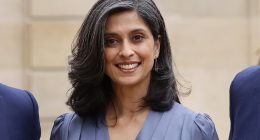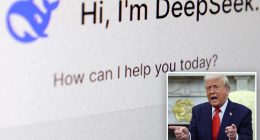Is Chappell Roan Gay? has been the trending question online as people are curious to learn more about her sexual preference. Read the article to learn more about her gender and sexuality.
Chappell Roan, born Kayleigh Rose Amstutz on February 19, 1998, is a distinctive American singer and songwriter celebrated for her unique musical approach.
Renowned for crafting her own songs, Roan’s music is characterized by a pop foundation intertwined with a hauntingly dark ambiance and poignant lyrics.
Her genre-defying style blends organic and electronic elements, earning her the label of “dark pop with ballad undertones.”
With a significant online presence, Roan showcases her talent through official music videos and live performances on platforms like YouTube.
Engaging with her audience on Twitter, she provides regular updates on her musical endeavors, contributing to her growing prominence in the industry.
Read more: Violette Guillon Parents: Meet Muriel And Stéphane, Family Life
Fact Check: Is Chappell Roan Gay?
Chappell Roan, born Kayleigh Rose Amstutz on February 19, 1998, not only captivates audiences with her unique musical style but also stands as an openly queer artist.
Embracing her identity, she has courageously discussed her queerness in various interviews, shedding light on her personal experiences.
In a candid conversation with the Los Angeles Times, Roan openly revealed her relationship with another woman, offering insights into the challenges she faced, particularly the apprehension of expressing affection in public.
This vulnerability in sharing her story adds depth to her artistry, making her a relatable figure to a diverse audience.
During interviews at live shows, she has further affirmed and celebrated her queerness, contributing to the visibility of LGBTQ+ artists in the music industry.
Roan’s openness about her identity not only enhances her authenticity as an artist but also fosters inclusivity, making her a role model for those who may find solace and inspiration in her journey as a talented, queer musician.
Her willingness to share her personal narrative enriches the tapestry of diversity within the realm of music, contributing to a more inclusive and understanding cultural landscape.
Chappell Roan Gender
Chappell Roan, originally known as Kayleigh Rose Amstutz, not only captivates audiences with her distinct musical style but also stands proudly as a queer woman, fearlessly sharing her journey in multiple interviews and articles.
In a poignant conversation with the Los Angeles Times, Roan openly discussed her romantic involvement with another woman, offering a glimpse into the challenges faced by individuals in same-sex relationships.
Her candid admission of being apprehensive about public displays of affection reflects the struggles many in the LGBTQ+ community encounter in navigating societal norms.
Beyond the confines of traditional expectations, Roan’s transparency about her queerness extends to interviews at live shows, where she openly acknowledges and celebrates her identity.
By doing so, she not only empowers herself but also contributes to the visibility and representation of LGBTQ+ individuals within the music industry.
Roan’s willingness to share the complexities of her personal life resonates with fans, creating a deeper connection between the artist and the audience.
In embracing her queerness, Chappell Roan emerges not just as a talented musician but also as a beacon of authenticity, courageously challenging stereotypes and fostering a more inclusive cultural narrative.
Her openness about love and identity amplifies the importance of diverse voices within the realm of music, making her an inspiring figure for those navigating similar paths.
Chappell Roan Sexuality
Chappell Roan, born Kayleigh Rose Amstutz, stands at the intersection of musical brilliance and unapologetic queerness, as she fearlessly shares her authentic self in interviews and articles.
Her journey unfolds not just as a musician but as an advocate for LGBTQ+ visibility, breaking barriers in an industry that often demands conformity.
In these discussions, Roan unveils the intricacies of her romantic life, openly revealing her relationship with another woman.
Her vulnerability extends beyond personal narratives, shedding light on the challenges she confronted growing up in a conservative and repressive environment.
Roan transforms her struggles into a powerful narrative, challenging societal norms with her unfiltered expression.
This openness about her queerness transcends mere disclosure; it permeates her artistry, influencing her music’s depth and resonance.
Roan emerges as a trailblazer, navigating uncharted territories with an unwavering commitment to authenticity.
The media has rightfully hailed her as a “queer pop icon” and a “queer pop superstar,” recognizing not just her musical prowess but also her pivotal role in diversifying and expanding the narrative of pop culture.
Roan’s journey becomes a beacon for those grappling with their identities in less accepting environments, proving that authenticity is not only a revolutionary act but also a transformative force within the realm of music and beyond.
Read more: Fact Check: Is Tate McRae Lesbian? Gender And Sexuality





